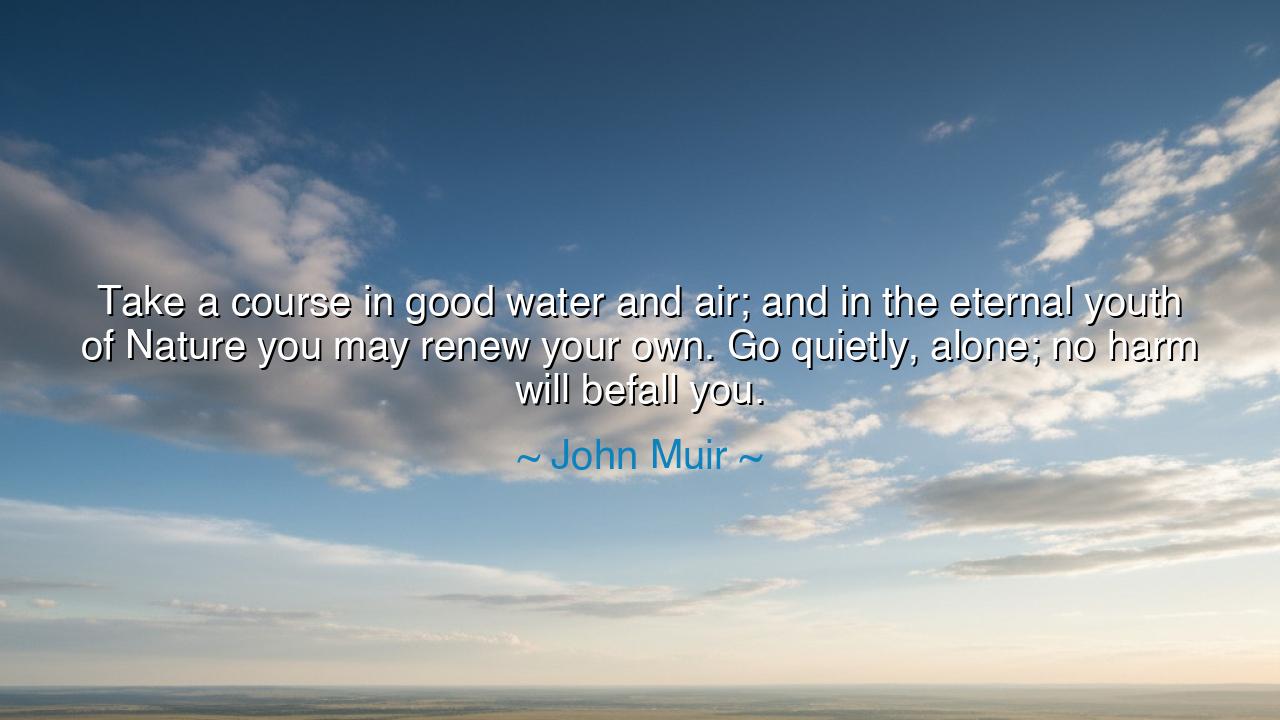
Take a course in good water and air; and in the eternal youth of
Take a course in good water and air; and in the eternal youth of Nature you may renew your own. Go quietly, alone; no harm will befall you.






In the tender yet thunderous voice of John Muir, the wanderer of mountains and prophet of wild places, we hear this sacred invitation: “Take a course in good water and air; and in the eternal youth of Nature you may renew your own. Go quietly, alone; no harm will befall you.” These words rise like the song of a clear stream running through sunlight, calling humankind back to the source from which it came. They are not merely the musings of a naturalist, but the wisdom of one who found in the forests and rivers the reflection of the divine. Muir’s teaching is simple and eternal: to be healed, return to Nature; to remember who you are, walk among the trees and breathe the living air.
John Muir, the founder of the American conservation movement and father of the national parks, spoke these words from the depths of his communion with the wild. He had roamed the high Sierras, slept beneath the open sky, and climbed into the crowns of storm-tossed trees to feel the heartbeat of creation. To Muir, Nature was not scenery—it was spirit. It was the body of God’s imagination, the living scripture of the world. When he said, “Take a course in good water and air,” he meant more than a journey through the wilderness; he meant a pilgrimage of the soul, a return to purity after the corruption of noise and haste. For Muir saw that civilization, though rich in invention, often starved the spirit. It built walls around the human heart, until men forgot the fragrance of pine and the sound of their own stillness.
When he speaks of the “eternal youth of Nature,” he reminds us that the earth never ages. The same wind that whispered through the redwoods a thousand years ago whispers still; the same mountains that watched the dawn of humankind continue to stand, unwearied and sublime. To walk among them is to remember the agelessness of life, to feel again the immortality of being. In Nature, death itself is but renewal—a leaf falls, a seed rises. Thus, by joining ourselves to Nature’s rhythm, we too are renewed. The soul, wearied by the world’s machinery and competition, finds peace in the eternal patience of the hills, and strength in the quiet persistence of the rivers. Muir teaches that the wilderness is not a retreat, but a rebirth.
His instruction to “go quietly, alone” carries the wisdom of solitude. In a world driven by noise and ceaseless striving, to walk alone is to meet the truth that lies beneath all illusions. Solitude is the great purifier; it strips away the false identities and leaves only what is real. When Muir says that “no harm will befall you,” he is not denying the dangers of the wild, but affirming the benevolence of Nature toward the one who approaches it with reverence. He himself often wandered alone through mountain storms, sleeping on icy ground or beneath towering cliffs, and yet he wrote of feeling perfectly safe, for he trusted the harmony of creation. Fear, he said, is born not from the wild, but from separation—from forgetting that we are part of the same breath that stirs the forests.
Consider the example of Henry David Thoreau, who many years before Muir retreated to the shores of Walden Pond. There he built a small cabin and lived simply, surrounded by water, air, and trees. In solitude, he discovered that the soul, when stripped of luxury and distraction, begins to shine with clarity. He wrote, “Heaven is under our feet as well as over our heads.” Like Muir, Thoreau saw that to live close to Nature is to recover wholeness—to heal from the sickness of modern life, which measures worth by gold and time rather than wonder. Both men, though living centuries ago, speak to the same ailment that afflicts us still: the disconnection between humanity and the living earth.
Muir’s words are not only poetry; they are prescription. To “take a course in good water and air” is to practice the art of renewal. It is to leave behind, even for a moment, the confined rooms of worry and enter the boundless cathedral of the world. There, the sunlight teaches gratitude; the flowing stream teaches persistence; the wind teaches freedom. The one who walks alone in reverence learns to trust life again. For in Nature, every path leads not away from the world, but back to oneself, and back to the eternal source of peace.
The lesson, then, is clear and enduring: when the burdens of life grow heavy, seek the embrace of the earth. Go to the river and let it cleanse your mind; breathe deeply of the forest air and let it wash your heart. Go quietly, as Muir counsels, and let silence speak. There you will find that the fears and ambitions that seemed so mighty are but shadows, and that the life within you is older and wiser than you knew. Let Nature be your teacher—its humility, your strength; its patience, your guide.
So remember this, O wanderer of the modern age: the world outside your door is not an enemy, but a healer. The mountains are ancient friends, the rivers are faithful companions, and the air itself is the breath of renewal. As John Muir taught, the eternal youth of Nature is not lost to us; it awaits all who will seek it in stillness and faith. Step out beneath the sky, go quietly, alone, and fear not—for in that sacred solitude, no harm will befall you. You will find yourself again in the everlasting arms of the Earth.






AAdministratorAdministrator
Welcome, honored guests. Please leave a comment, we will respond soon